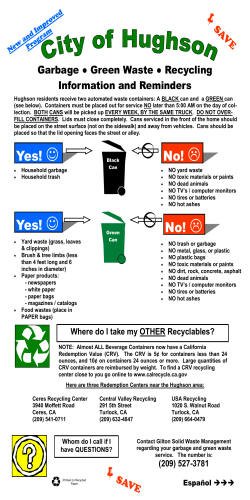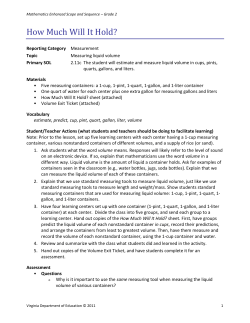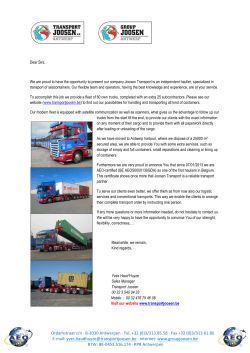
Container Management - CropLife International
Stewardship Vision 2020 The crop protection industry is taking the lead to ensure safe and responsible management of empty, properly rinsed pesticide containers worldwide. Through collaboration with governments and country stakeholders, our industry has a goal of recovering 50% of all crop protection containers by the year 2020. Container Management CropLife International aisbl 326 AVENUE LOUISE, BOX 35 1050 BRUSSELS BELGIUM The plant science industry provides farmers with crop protection products that enable them to improve agricultural productivity while sustainably managing precious natural resources such as land, soil and water. TEL +32 2 542 04 10 FAX +32 2 542 04 19 [email protected] Product packaging plays an essential role in ensuring that crop protection products are delivered safely to the intended customers, while minimizing the risk of leakage and exposure. The containers in which products are sold are part of the plant science industry’s lifecycle approach to product stewardship. The industry is committed to ensuring that all containers are treated and disposed of safely and appropriately. WWW.CROPLIFE.ORG Date of publication: March 2015 Stages in Container Management Many container management programs are now operating in countries around the world. These have been developed over several years and are often run in partnership between industry and government. The goals of these programs include: Research Active Ingredient/Formulation • safe delivery of crop protection products to the final customer Container Design Water soluble Recyclable Minimum waste/bulk • protecting both the environment and the operator from exposure • appropriate treatment and safe disposal of used packaging Training Transport Storage/ Distribution • reducing waste and maximizing recycling Handling • ensuring compliance with local packaging requirements and legislation Disposal Container management programs are supported across three main areas: Rinse 1. Research and design of containers Recover/Recycle Destroy New products Incinerate in approved facilities Energy Methanol Landfill/Bury Re-use (large, multi-trip containers) (preferred route) CropLife International is the voice of the global plant science industry. It champions the role of agricultural innovations in crop protection and plant biotechnology in supporting and advancing sustainable agriculture; helping farmers feed a growing population while looking after the planet; and progressing rural communities. The world needs farmers, and farmers need plant science. CropLife International is proud to be at the heart of helping farmers grow. (least preferred route) Helping Farmers Grow Container Management Safe and Effective Management of Empty Crop Protection Product Containers 2. Training on responsible use of pesticides for distributors, retailers and end-users 3. Support of recycling options Research and Design Training for Responsible Use Recycling The ideal approach for effective product design is to pro-actively mitigate potential issues by developing packaging that is safe, efficient and capable of being recycled or returned for re-use. The research and design phase is therefore a crucial component of the container management process. Such innovations include: Regional and national CropLife associations are also making a significant contribution to raise awareness about proper container management through training programs for distributors, retailers and most importantly – end users. The plant science industry supports a range of different programs that enable the collection and recycling of properly rinsed containers in specific countries. These programs are supported or delivered by regional and national CropLife associations. • small ready-to-use packs (suitable size for backpack sprayers) • multi-trip, returnable containers • one-way, single-trip containers made of recyclable materials Currently, one-way containers are most commonly used, with increasing use of multi-trip containers wherever practical. Training programs provide specifics on container management that include: • purchasing appropriately sized containers • never decanting crop protection products into other containers • never using empty containers for other uses (e.g., storing food, water, fuel) • properly cleaning and preparing empty containers for collection and recycling using the ‘triple rinsing’ method (see below) or sprayer-integrated pressure rinsing, followed by puncture of the rinsed container Triple rinsing empty containers is the recommended method promoted by the global CropLife network. Triple rinsing containers with water can remove 99.99% or more of the product. Similar results can be achieved with integrated pressure rinsing using specialized equipment incorporated in some modern, spray application equipment. Containers that are rinsed as described above should be regarded as non-hazardous waste. For more information on triple rinsing, please visit www.croplife.org. Recycling can take a number of different approaches: • recycle through re-use of multi-trip containers, especially suitable for large container volumes • recycling of the material, especially plastics, into other products with limited human contact (e.g., drainage pipes, electric conduit, car battery cases) • recovery of energy from containers, for example, thermal recovery in approved cement kilns • chemical conversion in methanol production In areas where recycling is not yet an option, the industry promotes the appropriate disposal of containers. Container Management in Action The global CropLife network is actively supporting and promoting container management programs around the world. Regional and national CropLife associations provide guidance and advice on how to establish a viable scheme, including health, safety and environmental standards, which should be adhered to in all schemes. Additional information can be found in the Roadmap for Establishing a Container Management Programme for Collection and Disposal of Empty Pesticide Containers at www.croplife.org. Under the Integrated Pest Management/Responsible Use training programs, more than 300,000 individuals are trained each year. Global reporting from regional associations indicates there has been a continual increase in the total amount of containers recovered, from 2.9 million kg of plastic containers in 2005 to more than 8 million kg in 2013. At the same time the specific cost of recycling has steadily decreased, making the sustainable introduction or continuation of container management programs more viable. The most successful programs have been delivered in partnership with other stakeholders, such as local authorities and government. In the majority of cases, industry has taken the initiative. The global CropLife network will continue to support and implement practical solutions that ensure the responsible management of crop protection containers around the world. For more information, please visit www.croplife.org For many years, the plant science industry has supported the collection and recycling of empty pesticide containers, as well as the collection, safeguarding and destruction of expired pesticides. The brand CleanFARMS is essentially a trademark, signifying programs that are supported by the global CropLife network. Originally developed by CropLife Canada, the brand has been made available to members of the global CropLife network that are implementing container management programs.
© Copyright 2026













